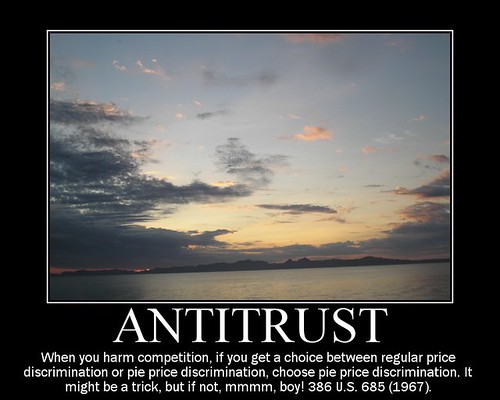 |
| Photo courtesy of rianap. |
The Court explained that to prevail the consumers must, "first show the existence of a relevant market and then establish that the pending acquisition is 'reasonably likely to cause anticompetitive effects' in that market. Earlier, this blog noted that there was a debate over which line of cases applied to determine whether a preliminary injunction should be awarded: Winter v. NRDC ("A plaintiff seeking a preliminary injunction must establish that he is likely to succeed on the merits, that he is likely to suffer irreparable harm in the absence of preliminary relief, that the balance of equities tips in his favor, and that an injunction is in the public interest") or Alliance for the Wild Rockies v. Cottrel ("the elements of the preliminary injunction test are balanced, so that a stronger showing of one element may offset a weaker showing of another...."). The Court said the test doesn't matter because the consumers fail at both.
To determine the "relevant market" the plaintiffs must establish a relevant product market and a relevant geographic market. The plaintiffs stated that the relevant product market is network carriers for business travelers and the relevant geographic market is 13 airports at which they argue competition will be decreased. At this point the injunction hearing turned into an expert battle with the Plaintiffs utilizing Prof. Darren Bush of the University of Houston and the defendants calling Prof. Daniel Rubenfeld of U.C. Berkeley.
Plaintiffs argued that Low Cost Carriers (LCCs) do not compete with business class traveler providers because business travelers have different needs and that the 13 airports represent the ones most commonly used by business travelers so that could also be a relevant market. Prof. Rubenfeld argued that LCCs do, in fact compete for business travelers and that consumers use airports near the 13 listed ones to travel (for example, a flight from New York to San Francisco would compete with a flight from Newark to Oakland). Dr. Bush, oddly, agreed and admitted he made no econometric analysis of his own.
As this blog has explained before, experts who change their mind are subject to being discarded under the Katy Perry Rule:
In her song, Hot 'n Cold Ms. Perry states, "You change your mind like a girl changes clothes...you overthink [and] always speak cryptically [therefore] I should know that you're no good for me." Similarly, witnesses who later change their mind are unreliable.
Judge Seeborg found that Dr. Bush's testimony largely agreed with Dr. Rubenfeld's and that both explained that the relevant market was different than the one the plaintiff's proposed. Businessweek explains:
The plaintiffs’ “failure to establish a viable relevant market dooms any effort to show this merger will substantially lessen competition, thereby negating their ability to raise even serious questions, let alone a likelihood of success on the merits,” which is required for granting a preliminary injunction, Seeborg wrote.Judge Seeborg denied the preliminary injunction. The case is Malaney v. UAL Corp. No. C 10-2858 and the order is below the jump.
Malaney v. UAL Corp.
No comments:
Post a Comment